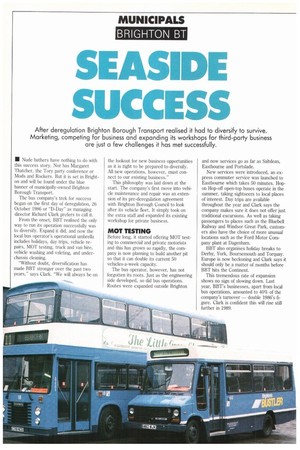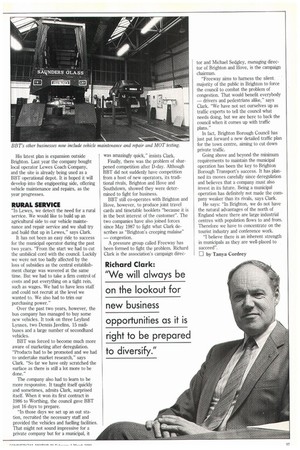SEASIDE SUCCESS
Page 38

Page 39

If you've noticed an error in this article please click here to report it so we can fix it.
After deregulation Brighton Borough Transport realised it had to diversify to survive. Marketing, competing for business and expanding its workshops for third-party business are just a few challenges it has met successfully.
• Nude bathers have nothing to do with this success story. Nor has Margaret Thatcher, the Tory party conference or Mods and Rockers. But it is set in Brighton and will be found under the blue banner of municipally-owned Brighton Borough Transport.
The bus company's trek for success began on the first day of deregulation, 26 October 1986 or "D-Day" as managing director Richard Clark prefers to call it.
From the onset, BBT realised the only way to run its operation successfully was to diversify. Expand it did, and now the local bus operator's operational umbrella includes holidays, day trips, vehicle repairs, MOT testing, truck and van hire, vehicle washing and valeting, and underchassis cleaning.
"Without doubt, diversification has made BBT stronger over the past two years," says Clark. "We will always be on the lookout for new business opportunities as it is right to be prepared to diversify. All new operations, however, must connect to our existing business."
This philosophy was laid down at the start. The company's first move into vehicle maintenance and repair was an extension of its pre-deregulation agreement with Brighton Borough Council to look after its vehicle fleet. It simply took on the extra staff and expanded its existing workshop for private business.
MOT TESTING
Before long, it started offering MOT testing to commercial and private motorists and this has grown so rapidly, the company is now planning to build another pit so that it can double its current 50 vehicles-a-week capacity.
The bus operator, however, has not forgotten its roots. Just as the engineering side developed, so did bus operations. Routes were expanded outside Brighton and now services go as far as Saltdean, Eastbourne and Portslade.
New services were introduced, an express commuter service was launched to Eastbourne which takes 50 minutes. Hopon Hop-off open-top buses operate in the summer, taking sightseers to local places of interest. Day trips are available throughout the year and Clark says the company makes sure it does not offer just traditional excursions. As well as taking passengers to places such as the Bluebell Railway and Windsor Great Park, customers also have the choice of more unusual locations such as the Ford Motor Company plant at Dagenham.
BBT also organises holiday breaks to Derby, York, Bournemouth and Torquay. Europe is now beckoning and Clark says it should only be a matter of months before BBT hits the Continent.
This tremendous rate of expansion shows no sign of slowing down. Last year, BBT's businesses, apart from local bus operations, amounted to 40% of the company's turnover — double 1986's figure, Clark is confident this Will rise still further in 1989. His latest plan is expansion outside Brighton. Last year the company bought local operator Lewes Coach Company, and the site is already being used as a BBT operational depot. It is hoped it will develop into the engjpeering side, offering vehicle maintenance and repairs, as the year progresses.
RURAL SERVICE
"In Lewes, we detect the need for a rural service. We would like to build up an agricultural side to our vehicle maintenance and repair service and we shall try and build that up in Lewes," says Clark.
It has not been an easy ride to success for the municipal operator during the past two years. "From the start we had to cut the umbilical cord with the council. Luckily we were not too badly affected by the loss of subsidies as the central establishment charge was wavered at the same time. But we had to take a firm control of costs and put everything on a tight rein, such as wages. We had to have less staff and could not recruit at the level we wanted to. We also had to trim our purchasing power."
Over the past two years, however, the bus company has managed to buy some new vehicles. It took on three Leyland Lynxes, two Dennis Javelins, 15 midibuses and a large number of secondhand vehicles.
BBT was forced to become much more aware of marketing after deregulation. "Products had to be promoted and we had to undertake market research," says Clark. "So far we have only scratched the surface as there is still a lot more to be done."
The company also had to learn to be more responsive. It taught itself quickly and sometimes, admits Clark, surprised itself. When it won its first contract in 1986 to Worthing, the council gave BBT just 16 days to prepare.
"In those days we set up an out station, recruited the necessary staff and provided the vehicles and fuelling facilities. That might not sound impressive for a private company but for a municipal, it was amazingly quick," insists Clark.
Finally, there was the problem of sharpened competition after D-day. Although BBT did not suddenly have competition from a host of new operators, its traditional rivals, Brighton and Hove and Southdown, showed they were determined to fight for business.
BBT still co-operates with Brighton and Hove, however, to produce joint travel cards and timetable booklets "because it is in the best interest of the customer". The two companies have also joined forces since May 1987 to fight what Clark describes as "Brighton's creeping malaise" — congestion.
A pressure group called Freeway has been formed to fight the problem. Richard Clark is the association's campaign direc tor and Michael Sedgley, managing director of Brighton and Hove, is the campaign chairman.
"Freeway aims to harness the silent majority of the public in Brighton to force the council to combat the problem of congestion. That would benefit everybody — drivers and pedestrians alike," says Clark. "We have not set ourselves up as traffic experts to tell the council what needs doing, but we are here to back the council when it comes up with traffic plans."
In fact, Brighton Borough Council has just put forward a new detailed traffic plan for the town centre, aiming to cut down private traffic.
Going above and beyond the minimum requirements to maintain the municipal operation has been the key to Brighton Borough Transport's success. It has planned its moves carefully since deregulation and believes that a company must also invest in its future. Being a municipal operation has definitely not made the company weaker than its rivals, says Clark.
He says: "In Brighton, we do not have the natural advantages of the north of England where there are large industrial centres with population flows to and from. Therefore we have to concentrate on the tourist industry and conference work.
"I believe there is an inherent strength in municipals as they are well-placed to succeed".
CI by Tanya Cordrey
















































































































































